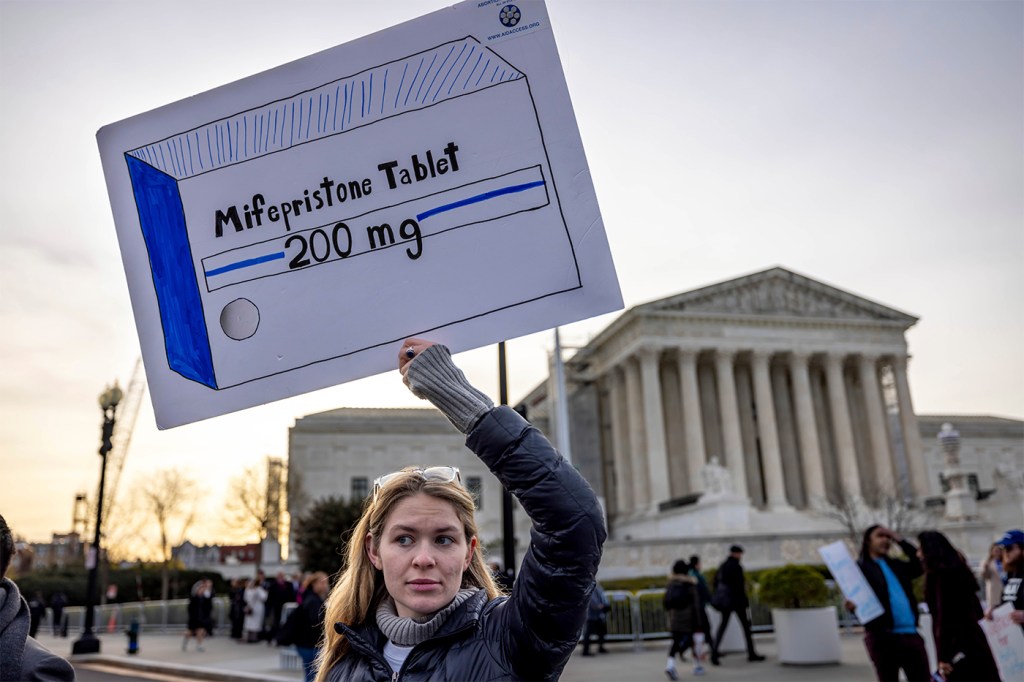Supreme Court ruling on the abortion pill ‘just a temporary pause in the battle’ over access, expert says
“One could also read today’s opinion as a roadmap for how to bring a more successful case next time around,” says Katherine Kraschel, an assistant professor of law and health sciences at Northeastern.

The Supreme Court on Thursday ruled that a group of doctors challenging the Food and Drug Administration’s more recent approvals of the abortion pill mifepristone didn’t have standing to bring the suit.
The unanimous ruling means that the case — FDA v. Alliance for Hippocratic Medicine — was dismissed.
The newer approvals that had been the source of the lawsuit, occurring in 2016 and 2021, expanded access to the drug by letting clinicians other than physicians prescribe it, as well as letting patients receive the pill by mail. The pill, which is used in up to 50% of abortions in the United States, will remain widely available.


But because the court didn’t get to rule on the merits of the question posed — whether the FDA acted lawfully in issuing those approvals — experts say that the battle to ensure access to mifepristone is far from over.
“This is just a temporary pause in the battle over mifepristone,” says Dan Urman, director of the law and public policy minor at Northeastern University. “They will search for better plaintiffs — not doctors — and instead perhaps try to file a suit on behalf of a patient.”
Following the ruling, anti-abortion activists vowed to continue pursuing legal methods to restrict use of the pill. “We’ll be back,” Kristan Hawkins, the president of Students for Life of America, said, according to the New York Times.
Featured Posts
There has been speculation that former President Donald Trump might, if elected in November, try to outlaw the pill through a dormant 19th-century “anti-vice” law that bans the mailing of “obscene” material. The statute itself defined contraceptives as “obscene and illicit.”
Urman says he thinks Trump would attempt to resurrect the 1873 law for that purpose: “If Trump wins in 2024, he will try to ban mifepristone through the Comstock Act, so the effort to ban mifepristone will continue,” he says.
Earlier this month, Trump said he would make an announcement related to his views on mifepristone — but one never came.
Katherine Kraschel, an assistant professor of law and health sciences at Northeastern who is an expert on health policy and reproduction, suggested that a second Trump presidency would be hugely consequential for the fight to maintain access to the pill.
“While the Supreme Court’s ruling is incredibly important to maintain access to abortion, the case should never have made it to the Supreme Court in the first place,” she says. “The unanimous decision reflects the weakness of the case from the start and the lawlessness of the circuit court’s previous decision.”
Kraschel suggested that, should Trump be elected, he may try to appoint an FDA commissioner who might be inclined to limit access to medication abortion using levers within the agency itself. “One could also read today’s opinion as a roadmap for how to bring a more successful case next time around,” she says.
“It’s important to remember that the case was about FDA approval of medication abortion, not state laws that regulate health care providers’ ability to prescribe it,” Kraschel says. “The decision has no bearing on state laws banning abortion. If abortion was illegal in a state yesterday, it’s still illegal there today.”











